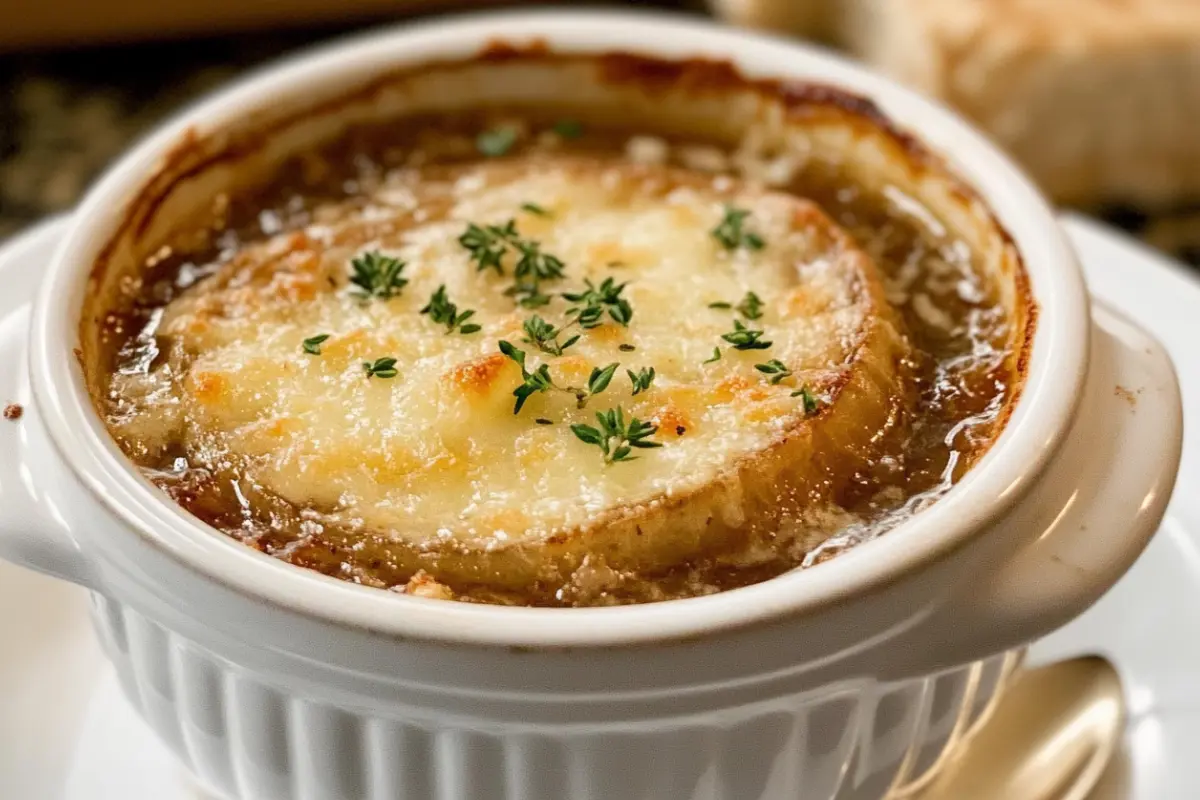French onion soup is a beloved classic, renowned for its rich, savory broth, sweet caramelized onions, and of course, that irresistible cheesy, crusty bread topping. It’s a comforting and flavorful dish, perfect for a chilly evening or a cozy meal. However, if you are mindful of your calorie intake, you might be wondering about french onion soup calories. Understanding the calorie content of french onion soup is key to enjoying this dish as part of a balanced diet. Therefore, let’s delve into the details of french onion soup calories, exploring what contributes to the calorie count, how it can vary, and how to make informed choices to savor this iconic soup without derailing your health goals.
Table of Contents
Understanding French Onion Soup Calories: What Contributes to the Calorie Count?
To accurately assess french onion soup calories, it’s essential to break down the key components of this dish and understand how each ingredient contributes to the overall calorie count. Several factors influence the calorie content of french onion soup.
- Onions: The Foundation (and Surprisingly Low Calorie): While onions are the star ingredient, they are surprisingly low in calories. Onions primarily contribute carbohydrates, fiber, and flavor, but are not a significant source of calories. However, the quantity of onions used does impact the total calorie count; more onions mean slightly more calories, though still relatively low. Therefore, while plentiful, onions themselves are not the primary driver of french onion soup calories.
- Broth: A Variable Calorie Base: The type of broth used significantly affects french onion soup calories.
- Beef Broth: Traditional french onion soup often uses beef broth, which can contribute a moderate amount of calories, depending on whether it’s homemade or store-bought, and its fat content. Richer beef broth, especially homemade with marrow bones, will be higher in calories.
- Chicken Broth: Chicken broth is generally lower in calories than beef broth and can be a lighter alternative. Using low-sodium chicken broth is also a healthier choice overall.
- Vegetable Broth: For the lowest calorie broth option, vegetable broth is ideal. It provides a flavorful base with minimal calories and is suitable for vegetarian versions of french onion soup.
- Broth Fat Content: Regardless of the type, the fat content of the broth is a major factor in french onion soup calories. Skimming fat from homemade broth or choosing low-fat or fat-free commercial broths can significantly reduce the calorie count. Therefore, broth selection is crucial for controlling french onion soup calories.
- Butter or Oil: Sautéing and Richness: Butter or oil is typically used to sauté the onions, adding flavor and richness. However, fats are calorie-dense, so the amount used directly impacts french onion soup calories.
- Butter: Butter contributes a rich flavor but is higher in saturated fat and calories than oil.
- Olive Oil: Olive oil is a healthier fat option, lower in saturated fat than butter, but still contributes calories. Using a moderate amount of olive oil is a good compromise between flavor and calorie control.
- Amount Used: Reducing the amount of butter or oil, or using cooking spray instead, can be effective strategies to lower french onion soup calories.
- Wine (Optional but Flavorful): Dry wine, often dry sherry or white wine, is frequently added to french onion soup for depth of flavor. Wine contributes some calories, primarily from alcohol, but in moderate amounts, the calorie contribution is relatively small compared to other components. However, it is still a factor in overall french onion soup calories.
- Bread Topping: A Significant Calorie Source: The bread topping is a major contributor to french onion soup calories.
- Type of Bread: The type of bread used significantly affects french onion soup calories. Thick slices of baguette or crusty bread will contribute more calories than thinner slices or lower-calorie bread options.
- Bread Quantity: The number of bread slices per serving directly impacts french onion soup calories. Larger portions of bread will substantially increase the calorie count.
- Toasting or Croutons: Toasting or making croutons with butter or oil further adds to the calorie content of the bread topping.
- Cheese Topping: The Richest Calorie Component: The cheese topping is often the most calorie-dense component of french onion soup.
- Type of Cheese: The type of cheese used has a major impact on french onion soup calories. Gruyere, a classic choice, is relatively high in fat and calories. Other cheeses like Swiss, provolone, or even lower-fat mozzarella can be used, each with different calorie profiles.
- Cheese Quantity: The amount of cheese used per serving is a primary factor in french onion soup calories. Generous amounts of cheese will significantly increase the calorie count. Using less cheese or opting for a lower-fat cheese is a key strategy for reducing french onion soup calories.
- Cheese Fat Content: The fat content of the cheese directly correlates with its calorie count. Choosing lower-fat cheese varieties can reduce french onion soup calories without completely sacrificing the cheesy element.
Therefore, understanding how each of these components contributes to french onion soup calories allows for informed choices and modifications to enjoy this dish while being mindful of calorie intake.
Average French Onion Soup Calories: What to Expect
So, what is the average calorie count for a serving of french onion soup? The answer is, it varies. However, we can provide some general ranges to give you an idea of what to expect for french onion soup calories.
- *Restaurant French Onion Soup Calories: Restaurant versions of french onion soup tend to be higher in calories. A typical restaurant serving of french onion soup, including the bread and cheese topping, can range from 300 to 500 calories or even more. This is often due to larger portion sizes, richer broths, generous amounts of butter or oil in sautéing the onions, thicker bread slices, and liberal cheese toppings, often using high-fat cheeses like Gruyere. Therefore, restaurant french onion soup calories can be substantial.
- Homemade French Onion Soup Calories (Classic Recipe): A classic homemade french onion soup recipe, made with beef broth, butter, baguette, and Gruyere cheese, will generally be in the 250 to 400 calorie range per serving. This is still a moderate calorie count, primarily due to the cheese and bread. However, homemade versions often allow for more control over ingredients and portion sizes compared to restaurant servings, potentially leading to slightly lower french onion soup calories.
- *Light or Lower-Calorie French Onion Soup Calories: By making strategic substitutions and modifications, you can significantly reduce french onion soup calories. A lighter version, using vegetable broth, minimal olive oil, thinner bread slices, and reduced-fat cheese, can come down to the 150 to 250 calorie range per serving. Very light versions, focusing on broth and onions with minimal toppings, might even be under 150 calories. Therefore, french onion soup calories can be significantly reduced with mindful ingredient choices.
However, these are just general estimates. The actual french onion soup calories will vary depending on the specific recipe, ingredients, and portion size. For precise calorie information, it is best to use a calorie counting app or online nutritional calculator, especially if you are making homemade french onion soup and know the exact quantities of each ingredient.

French Onion Soup Calories Breakdown: Dissecting a Typical Serving
To better understand french onion soup calories, let’s break down the approximate calorie contribution of each component in a typical homemade serving (estimated to be around 300-350 calories):
- Broth (Beef Broth, 1.5 cups): Approximately 50-80 calories (depending on fat content).
- Onions (2 medium onions, caramelized): Approximately 60-80 calories.
- Butter/Olive Oil (1 tablespoon): Approximately 120 calories.
- Wine (1/4 cup): Approximately 25 calories.
- Baguette Slice (1 slice, 1 inch thick): Approximately 70-100 calories.
- Gruyere Cheese (1 ounce): Approximately 100-120 calories.
Total Estimated French Onion Soup Calories: Approximately 425-525 calories.
Lightened Version Breakdown (Estimated total: 200-250 calories):
- Vegetable Broth (1.5 cups): Approximately 30-50 calories.
- Onions (2 medium onions, caramelized): Approximately 60-80 calories.
- Olive Oil (1 teaspoon): Approximately 40 calories.
- Wine (1/4 cup): Approximately 25 calories.
- Thin Bread Slice (lower-calorie bread): Approximately 40-60 calories.
- Reduced-Fat Mozzarella (0.5 ounce): Approximately 40-50 calories.
Total Estimated Light French Onion Soup Calories: Approximately 235-305 calories.
Therefore, these breakdowns illustrate how ingredient choices and portion control significantly impact french onion soup calories. By making lighter substitutions, you can enjoy french onion soup with significantly fewer calories.
Strategies to Reduce French Onion Soup Calories: Making it Lighter
If you love french onion soup but want to reduce its calorie content, there are several effective strategies you can employ without sacrificing too much flavor or satisfaction. Here are some key modifications to lower french onion soup calories:
- Choose Lower-Calorie Broth: Opt for vegetable broth or low-fat chicken broth instead of traditional beef broth. These broths provide a flavorful base with significantly fewer calories and less fat. Homemade broth, with fat skimmed off, is also a good option for calorie control.
- Minimize Butter or Oil: Reduce the amount of butter or oil used to sauté the onions. Use cooking spray instead of butter or oil to start sautéing, then add a minimal amount of olive oil for flavor. Caramelizing onions with broth or water initially can also reduce the need for excessive fat.
- Use Less Cheese or Lower-Fat Cheese: The cheese topping is a major calorie contributor. Use a smaller amount of cheese per serving. Choose lower-fat cheese varieties like part-skim mozzarella, reduced-fat Swiss, or a lighter provolone. Stronger flavored lower-fat cheeses can provide more flavor with less quantity.
- Lighten the Bread Topping: Use thinner slices of bread or opt for lower-calorie bread options. Consider using whole wheat bread for added fiber and nutrients. Reduce the number of bread slices per serving. Lightly toast the bread without butter or oil, or use air-frying for crispiness instead of deep-frying croutons. You can even consider skipping the bread topping altogether for a significant calorie reduction, focusing on the soup itself.
- Increase Vegetable Content: Adding more vegetables to the soup, such as mushrooms, leeks, or carrots (while still keeping onions as the star), can increase volume and nutrients without significantly adding to french onion soup calories. Vegetables are naturally low in calories and high in fiber, contributing to satiety.
- Control Portion Sizes: Be mindful of portion sizes. Serving smaller bowls of french onion soup naturally reduces the overall calorie intake per meal. Use smaller bowls and be aware of recommended serving sizes.
- Skim Fat from Broth: If using homemade broth, chill it after cooking and skim off the solidified fat from the surface before making the soup. This simple step can remove a significant amount of fat and reduce french onion soup calories.
- Consider Broiling Cheese Separately: Instead of melting cheese directly into the soup bowl with bread, consider broiling the cheese on bread slices separately and then placing the cheesy bread on top of the soup. This can sometimes allow for using less cheese while still achieving the desired cheesy topping effect.
However, by implementing these strategies, you can create a lighter and healthier version of french onion soup that is lower in calories without sacrificing enjoyment.
French Onion Soup Calories vs. Other Soups: A Comparative Look
To put french onion soup calories into perspective, let’s compare it to the calorie content of other popular soups. This will help you understand where french onion soup falls on the calorie spectrum and make informed choices when selecting soup options.
- Chicken Noodle Soup: A typical bowl of chicken noodle soup (about 1 cup) generally contains around 100-200 calories. This is significantly lower than average french onion soup calories, especially restaurant versions. Chicken noodle soup is often broth-based with lean protein and vegetables, making it a lighter option.
- Tomato Soup: Tomato soup (1 cup) can range from 80-150 calories, depending on whether it’s cream-based or broth-based. Broth-based tomato soup is a very low-calorie option, while cream-based versions are higher due to added cream or milk. Compared to french onion soup calories, tomato soup can be a lighter choice, particularly broth-based varieties.
- Broccoli Cheddar Soup: Broccoli cheddar soup (1 cup) is typically much higher in calories, ranging from 250-400 calories or more. This is due to the creamy base (often cream and cheese) and cheese content. Broccoli cheddar soup can be comparable to or even higher in calories than some restaurant versions of french onion soup.
- Clam Chowder (New England): New England clam chowder (1 cup) is also relatively high in calories, often around 200-300 calories or more. The creamy base (cream or milk), butter, and bacon contribute to its higher calorie count. Clam chowder can be in a similar calorie range as classic homemade french onion soup.
- Minestrone Soup: Minestrone soup (1 cup), a vegetable-rich Italian soup, is generally a lower-calorie option, typically around 100-150 calories. It’s packed with vegetables, beans, and pasta in a broth base, making it nutritious and relatively low in calories. Minestrone soup is usually lighter than french onion soup.
- Lentil Soup: Lentil soup (1 cup) is also a moderately low-calorie and very nutritious option, usually around 150-250 calories. Lentils provide protein and fiber, making it a filling and healthy soup choice. Lentil soup can be comparable to lighter versions of french onion soup in terms of calories.
Therefore, when considering french onion soup calories in the context of other soups, it falls in the mid-to-higher range, especially when compared to broth-based vegetable or chicken soups. Creamy and cheese-based soups like broccoli cheddar or clam chowder can be in a similar or even higher calorie range. Lighter versions of french onion soup can be brought down to a more moderate calorie level, comparable to lentil or minestrone soup.
Beyond French Onion Soup Calories: Nutritional Benefits
While understanding french onion soup calories is important, it’s also crucial to consider the nutritional benefits this dish offers beyond just calories. French onion soup, especially when made with wholesome ingredients, can provide valuable nutrients.
- Onions: Rich in Antioxidants and Nutrients: Onions, the star ingredient, are packed with beneficial compounds. They are a good source of vitamin C, fiber, and antioxidants, including quercetin. Antioxidants help protect cells from damage. Onions also contain compounds that may have anti-inflammatory and immune-boosting properties. Therefore, the onion base of french onion soup contributes significant nutritional value.
- Broth: Hydration and Minerals: Broth, whether beef, chicken, or vegetable, provides hydration and electrolytes. Bone broths, particularly beef broth, can be a source of collagen and minerals like phosphorus and potassium. Vegetable broth offers vitamins and minerals from the vegetables used to make it. Broth contributes to the overall nutritional profile of french onion soup.
- Protein (from Broth and Cheese): While not a high-protein dish, french onion soup does provide some protein from the broth (especially beef or chicken broth) and the cheese topping. Protein is essential for satiety, muscle maintenance, and various bodily functions.
- Vitamins and Minerals (from Vegetables): If vegetables beyond onions are added, such as carrots, celery, or mushrooms, french onion soup can provide additional vitamins and minerals. These additions enhance the nutritional diversity of the soup.
- Comfort and Satisfaction: Beyond specific nutrients, french onion soup offers comfort and satisfaction. It’s a warm, flavorful, and comforting dish that can be mentally and emotionally nourishing. Enjoying meals that bring pleasure and satisfaction is also an important aspect of overall well-being.
However, to maximize the nutritional benefits and minimize less desirable aspects, focus on homemade versions with wholesome ingredients, lower sodium broth, and moderate cheese and bread portions. Consider adding more vegetables to further boost the nutritional value of your french onion soup.
French Onion Soup in a Balanced Diet: Making it Fit
Can french onion soup fit into a balanced diet, even if you are watching your calorie intake? Absolutely! The key is to be mindful of portion sizes and ingredient choices. Here’s how to incorporate french onion soup into a balanced eating plan:
- Enjoy in Moderation: Like any dish, moderation is key. Enjoy french onion soup as an occasional treat or as part of a balanced meal plan, rather than an everyday staple, especially if you are watching french onion soup calories.
- Choose Lighter Versions: Opt for lighter versions of french onion soup made with vegetable broth, minimal fat, lower-calorie cheese, and a light bread topping. Homemade lightened recipes are ideal for calorie control.
- Pair with a Salad or Lighter Meal: Balance out a serving of french onion soup with a large salad, grilled vegetables, or a light protein source to create a more complete and balanced meal. This helps to increase overall nutrient intake and manage calorie density of the entire meal.
- Be Mindful of Toppings: Be aware that the bread and cheese topping significantly contribute to french onion soup calories. Control the amount of bread and cheese, or consider having french onion soup without the toppings occasionally to reduce calorie intake.
- Incorporate into a Flexible Diet: A flexible approach to dieting allows for enjoying favorite dishes like french onion soup while still maintaining a healthy eating pattern overall. Plan for french onion soup as a treat within your weekly or monthly meal plan, adjusting other meals accordingly to balance your calorie intake over time.
- Focus on Homemade: Homemade french onion soup gives you the most control over ingredients and french onion soup calories. You can tailor recipes to be lighter and healthier while still enjoying the flavors you love.
However, by being mindful and making informed choices, french onion soup can be a delicious and enjoyable part of a balanced and healthy diet.
Conclusion: Savoring French Onion Soup Mindfully
French onion soup is a timeless classic, offering rich flavors and comforting warmth. Understanding french onion soup calories empowers you to enjoy this dish in a way that aligns with your health and dietary goals. While traditional restaurant and classic homemade versions can be moderately high in calories, primarily due to the cheese and bread topping, french onion soup calories can be significantly reduced by making strategic ingredient substitutions and modifications.
Therefore, by choosing lighter broths, minimizing added fats, using lower-calorie cheese and bread options, and controlling portion sizes, you can savor the delightful flavors of french onion soup without excessive calorie intake. Remember to consider the nutritional benefits beyond french onion soup calories, and enjoy this iconic soup as part of a balanced and mindful approach to eating. Whether you opt for a classic indulgence or a lightened version, french onion soup can be a delicious and satisfying addition to your culinary repertoire.

Nutritional Information: Classic Homemade French Onion Soup (per serving, approximate)
(Using beef broth, butter, baguette, Gruyere cheese, approximate values)
| Nutrient | Amount | % Daily Value* |
| Calories | 450 | |
| Protein | 20g | 40% |
| Fat | 25g | 38% |
| Saturated Fat | 15g | 75% |
| Cholesterol | 80mg | 27% |
| Sodium | 900mg | 39% |
| Carbohydrates | 35g | 12% |
| Fiber | 3g | 12% |
| Sugar | 15g | |
| Vitamin C | 15mg | 25% |
| Iron | 2mg | 11% |
| Calcium | 250mg | 25% |
*Percent Daily Values are based on a 2,000 calorie diet. Your daily values may be higher or lower depending on your calorie needs. Nutritional values are approximate and can vary based on specific ingredients and preparation methods. Restaurant versions may have higher french onion soup calories.
Frequently Asked Questions (FAQs)
Q: How many calories are in a cup of French onion soup?
A: The calorie count in a cup of french onion soup varies significantly depending on the recipe and serving size. A typical cup (about 8 ounces or 240ml) of french onion soup, including broth, onions, bread, and cheese, can range from 200 to 400 calories. Lighter versions, with reduced cheese and bread, and broth-based soups will be at the lower end of this range, while richer, restaurant-style versions with generous toppings will be at the higher end or even exceed 400 calories per cup. Therefore, portion size and ingredients greatly influence french onion soup calories per cup.
Q: Is French onion soup high in calories?
A: Whether french onion soup is considered “high in calories” depends on individual dietary needs and comparisons to other foods. Compared to very low-calorie soups like broth-based vegetable soups, french onion soup is moderately higher in calories, especially due to the cheese and bread topping. A typical serving can range from 250 to 500+ calories. However, compared to many main course dishes or creamy soups, it may be considered moderate. Lightened versions can be lower in calories. Therefore, french onion soup calories are moderate and can be managed with recipe modifications and portion control.
Q: How can I make French onion soup lower in calories?
A: You can make french onion soup lower in calories by making several ingredient substitutions and modifications. Use vegetable broth or low-fat chicken broth instead of beef broth. Minimize butter or oil when sautéing onions, using cooking spray or broth instead. Reduce the amount of cheese, or use lower-fat cheese like part-skim mozzarella. Use thinner slices of bread or lower-calorie bread options, or reduce the quantity. Increase the vegetable content. Control portion sizes. These strategies can significantly reduce french onion soup calories while still retaining much of the flavor and enjoyment.
Q: Is French onion soup healthy for weight loss?
A: French onion soup can be part of a weight loss plan if consumed in moderation and in lighter versions. Broth-based soups can be filling and relatively low in calories, which can be helpful for weight management. However, traditional french onion soup with generous cheese and bread can be moderately high in calories. To make it weight-loss friendly, focus on lighter recipes with vegetable broth, minimal cheese and bread, and plenty of onions and vegetables. Control portion sizes and balance it with other healthy, lower-calorie meals. Therefore, lighter french onion soup, in moderation, can fit into a weight loss diet.
Q: What are the nutritional benefits of French onion soup besides calories?
A: Beyond french onion soup calories, it offers several nutritional benefits. Onions are rich in antioxidants, vitamin C, and fiber. Broth provides hydration and some minerals. Beef or chicken broth can offer collagen and protein. Vegetables added to the soup contribute vitamins and minerals. While not a nutritional powerhouse, french onion soup provides some valuable nutrients, especially when made with wholesome ingredients. However, it’s important to consider the sodium content, particularly in restaurant or canned versions, and to balance it with other nutrient-rich foods in your diet.

